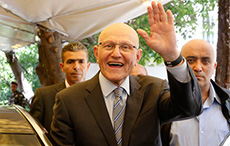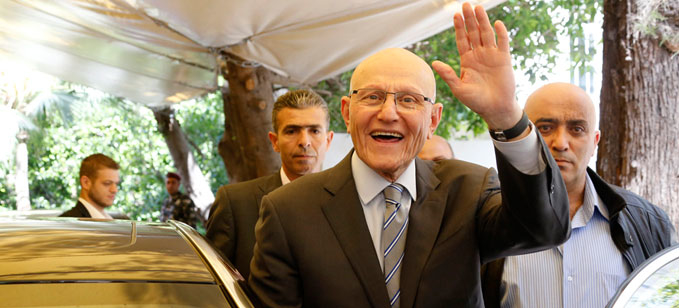When Born, New Cabinet to Assume Presidential Role if Elections of State’s Head Not Held

As majorly focusing on the Syrian crisis and the impending Geneva talks, the international and regional track is making inroads into the efforts underway to agree on a national unity and partnership government in Lebanon.
Once again, Lebanon is bound to interacting and keeping up with the headway of matters on the international and regional levels. The country is not even capable of making policies or activating particular channels.
This confirms again the theory as per which Lebanon is the "lab" of international and regional relations and a scene to test intentions.

Ten months after the designation of Salam, many have raised such a salient question: how would an agreement over a government be possible before Geneva II?
The nature of the action underway on the regional level is the answer. Events are precipitating, one after another, as talks over the means to reach a political solution to the Syrian crisis near.
Noting the US-Russian entente on many files, the US-Iranian rapprochement over the nuclear dossier, the support Iraq has received in its war on terrorism in Anbar province, and the current uprising in North Syria against ISIS.
This panoramic view leads observers to conclude that Lebanon cannot keep faltering amid the current gridlock and stagnation.
In addition to the regional and international pressures that had hindered the Cabinet formation process ever since Salam was designated, the domestic security juncture emerged and almost drag the country into a grave state of severance, locally termed as "the divorce." Simultaneously, the looming constitutional dates--namely the election of a new president--have bogged down the choices of the local players and their regional and international masters, giving vent to fears of vacuum.
It was those givens that have driven parties into reciprocate concessions during the formation talks. This gave the impression that the country might witness the birth of the government soon, unless something occurs and halts the efforts on the go.
Yet, and despite the media hype, these efforts are still within the frame of agreeing on the form of the government. Discussing the state policy comes second.
Both sides are now in need of a new government for different considerations. Once the Cabinet's form determined, many scenarios are likely to take place. In fact, the new Cabinet will see the light, take its time discussing the state policy, and then face the confidence vote at the House. Nonetheless, with the motion of no confidence, the government will have to assume a caretaking mission and may even rule in case of vacuum at the presidential post. This is, in a nutshell, why everybody is watchful.
Quandaries won't be defused in ten days from now. The influential sides and forces can only make concessions, in order to shirk void, and leave divisive issues like the Army-Resistance-People trinity and Baabda Declaration to sometime later, after the government is born.
Actually, March 8 camp does just not want a fait accompli Cabinet.
For their part, March 14 forces do not wish to lead the presidential elections while Najib Mikati is still on top of the executive power. Therefore, both parties had best agree on a government empowered to issuing decrees and that will try to draft a ministerial statement satisfactory to all. In the event of a motion of no confidence, the new Cabinet will be of a caretaker capacity. When born, this government will turn into an interim presidential council if a new head of the Lebanese state is still unelected.
Source: Ghassan Jawad - al-Joumhouriya newspaper*
*Translated by al-Ahed news
Comments




